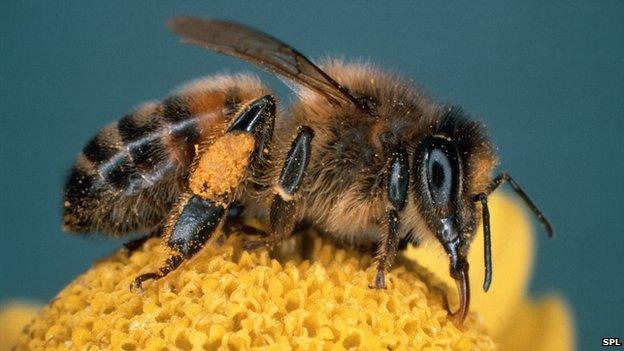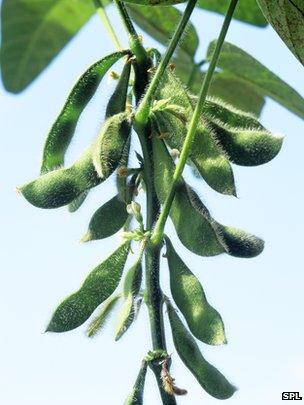Bee deaths: EU delays action on pesticides ban
- Published

A decline in bee numbers has been linked by the EU to use of some pesticides
EU nations have been unable to reach agreement on proposals to ban the use of three pesticides that have been linked to the decline of bees.
The European Commission had called for a two-year EU-wide moratorium, but a number of nations opposed the plans.
A recent report by the European Food Safety Agency (EFSA) concluded that the pesticides posed a "high acute risk" to pollinators, including honeybees.
The commission is expected to redraft its proposals ahead of another vote.
Member states were unable to reach a qualified majority in order for the proposals to be adopted.
The news of the stalemate has angered groups that had been campaigning in favour of the ban.
Unknown consequences
A spokeswoman for Defra, the UK's environment department, said 14 out of the 27 EU nations - including the UK and Germany - had not supported the commission's proposals as they currently stood.

The commission proposed to ban the use of the chemicals on crops that attracted bees
"Bee health is extremely important but decisions must be based on sound scientific evidence and rushing this through could have serious unintended consequences both for bees and for food production," she added.
"We are currently finalising studies that will give us the evidence on which to base a proper decision. But as we do not have the evidence yet, it is impossible for us to vote either way."
Global web-based campaign group Avaaz condemned the UK's and Germany's decision to abstain, saying the governments had "caved in to the industry lobby".
"Today's vote flies in the face of science and public opinion and maintains the disastrous chemical armageddon on bees, which are critical for the future of our food," said Avaaz senior campaigner Iain Keith.
In a YouGov poll commissioned by the campaign network, 71% of almost 2,000 people questioned in the UK supported the commission's proposals to impose the moratorium on the insecticides.
Avaaz said that it, along with other groups, would be taking legal advice as to whether the outcome of the vote could be challenged in the courts.
The chemicals in question - imidacloprid, thiamethoxam and clothianindin - belong to a class of insecticides known as neonicotinoids.
The insecticides work by affecting the central nervous system of insects, causing paralysis and death.
'Data shortcomings'
A report published by EFSA scientists in January identified a number of risks posed by the three insecticides, external.
It assessed the possible threats to the pollinators from exposure to residues in pollen and nectar, dust and guttation fluid (some plants exude sap in the form of droplets).
However, it added that in some cases it was "unable to finalise the assessments due to shortcomings in the available data".
Bee expert Prof David Goulson from the University of Stirling said he was disappointed that the proposals had not been adopted.
"The panel of independent experts at EFSA spent six months studying all the evidence before concluding that current use of neonicotinoids posed an unacceptable risk to bees," he observed.
However, Prof Lin Field, head of crop protection at Rothamsted Research, said she was pleased with the outcome of the vote.
"In my view there is still is not enough clear evidence supporting a ban on neonicotinoids," she explained.
"Of course they can kill bees; they are insecticides. But whether they actually do this or whether sub-lethal effects occur and damage the colonies on any important scale has not been proven."
A number of EU countries, including Italy, have imposed a ban on the use of the chemicals at a national.
Arable farmer Mark Leggett echoed Prof Field's comments, adding: "We must be careful not to remove a product from the marketplace which is proving itself of massive worth in terms of controlling pests.
"We would be forced to go back and use old chemistry and less environmentally friendly alternatives… and if the aphids have resistance, we might not be able to control the aphids," he told the BBC's Farming Today programme.
In a statement, pesticide manufacturer Bayer CropScience said the failure to reach agreement showed that there was "no convincing argument against the continuing use of neonicotinoid-based products".
"Not only had the commission incorrectly based their rationale on recent EFSA reviews of these products, they had failed to make the appropriate impact assessments of any decisions they proposed on the broader interests of European stakeholders," it added.
Friends of the Earth's head of campaigns Andrew Pendleton said that there was "more than enough evidence that these chemicals are linked to bee decline to place immediate restrictions on their use".
"This is a cop-out by a significant number of European governments, including the UK - it means yet more dither and delay while our bee populations plummet," he added.
Chris Hartfield, head of bee health for the NFU, the UK's largest farming organisation, said: "We maintain that the proposed ban is not a proportionate response to the evidence we have available."
Dr Hartfield added that bee health in the EU was "challenged by a range of different factors".
"Since there is no evidence to pin the widespread declines of bee populations on any single factor, a proposed ban on neonicotinoids is unlikely to deliver any benefits that will halt or reverse these declines," he suggested.
Professor Jim Iley, executive director of science and education at the Royal Society of Chemistry told BBC News that gaps in data meant there was still a "degree of uncertainty" about the impact of the chemicals.
"If the cause is wrongly diagnosed, the precautionary action taken may be inappropriate," he said.
Following the vote, EU officials said that EU Health Commissioner Tonio Borg would "consider the next step".
- Published31 January 2013
- Published29 March 2012
- Published22 June 2010